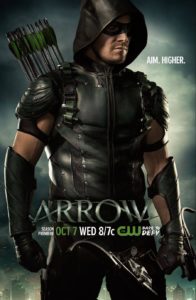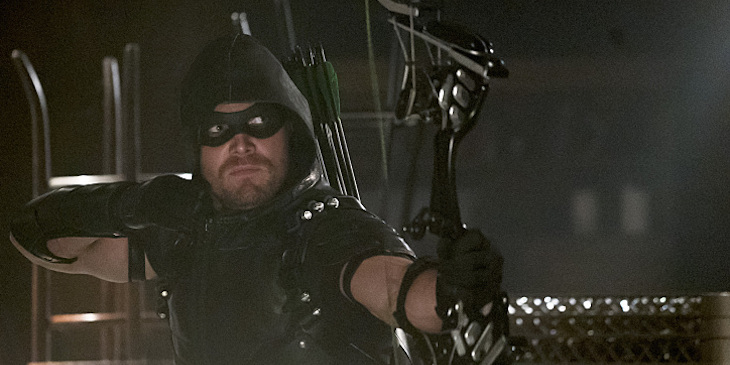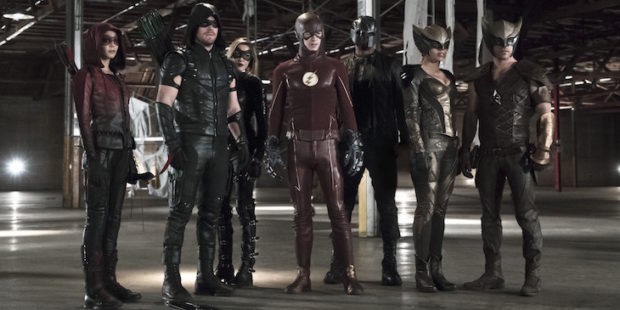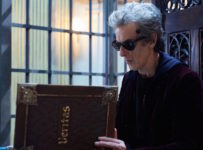 The Arrow becomes Green Arrow in a magic-focused season that aims to restore viewer faith. As always, some spoilers are ahead.
The Arrow becomes Green Arrow in a magic-focused season that aims to restore viewer faith. As always, some spoilers are ahead.
After three seasons of skirting around the issue, ARROW finally embraced its own roots and renamed its titular hero Green Arrow (Stephen Amell). It wasn’t the only pull from the source material either, as Thea (Willa Holland) slipped on her own red hood for a newfound purpose, officially giving Green Arrow a sidekick named Speedy. Ollie ran for Mayor, a storyline that has its roots in 1970s comics. Even the location fell in line with this new ethos and became known as Star City, instead of ‘Starling’. Partially influenced by sister show The Flash, also produced by Greg Berlanti and his colleagues, ARROW was allowed to drift away from the grounded grittiness and introduce metahumans and broader comic book concepts. Yet it still remains somewhat stuck in the grooves of its own formula, even if it is now heading firmly in the right direction.
After leaving the vigilante life behind to take a well-earned rest with love interest and partner Felicity (Emily Bett Rickards), Oliver Queen/The Arrow is called back to the freshly named Star City to fight a new threat. His friends John Diggle (David Ramsey), Laurel (Katie Cassidy), and Quentin (Paul Blackthorne) have been fighting off a group called ‘The Ghosts,’ apparently led by Damien Darhk (Neal McDonough). Ollie takes up the bow again with the new moniker ‘Green Arrow,’ designed to inspire hope in the beleaguered city. Ollie spends much of this season battling Darhk, and his terror organisation H.I.V.E., both as vigilante in the shadows and as a mayoral candidate in the light. It’s the first time that the show has fully embraced the idea of a not completely human foe, with magic a massive part of Darhk’s oeuvre, and this is mostly a positive addition.
Even so, the fourth season of ARROW struggled tonally, at once trying to be a stepping stone to spin-off series Legends of Tomorrow; forge a new identity that was distinct from the fully ‘grounded’ tone of the first three seasons; and also still maintain the narrative structure that both intrigued and hampered in the preceding years. Take for example the episode “Haunted,” mostly designed as a nod to fans and a chance to add John Constantine (Matt Ryan) into the Arrowverse following the cancellation of his own show. The regular flashbacks allowed for the introduction of the character and the notion of magic into the Ollie’s past, so that Constantine could come in and save the day in the present. Yet this simply exacerbated one of the main problems troubling this series, that the dedication to this idea of flashbacks had become a major burden by the show’s third season. In this fourth year, they feel almost entirely perfunctory. In the first half of the year, it also was difficult to get satisfactorily tipsy in any drinking game that required naming anything of any importance that didn’t just set up Legends of Tomorrow.
Yet to concentrate on these imbalances is to sell this keystone series short, as it remains the backbone of the Greg Berlanti productions for a reason, and not just because it was there first. The show kept us on the hook successfully for the majority of the season by teasing a funeral early on, but delivering a gut-punch in the last half-dozen episodes by claiming an unlikely victim. As annoyingly dominant as the ‘Olicity’ love story can be on occasion, the persistence of this fan coupling on screen gave us some of the deeper comic book pulls of the season when Felicity was temporarily unable to walk, instantly summoning a ‘Oracle’ vibe. Ollie’s candidacy for mayor is an interpretation of a classic Elliot S. Maggin (and later Judd Winick) storyline, and it always feels like it is being done with respect for that legacy. Watching animated spin-off Vixen (played by Megalyn Echikunwoke) in live action was literally watching a comic character come to life. More to the point, the wonderful Neal McDonough as Darhk provided a much-needed focus for the show as a singular villain, even if his ultimate plot was a bigger version of the first season’s threat, something the show itself is quick to acknowledge.
The finale, “Schism,” raised the stakes against the city so high that it is hard to know how the show can possibly top it. Indeed, it’s a problem the season leaves us to ponder until Season 5 kicks off in October 2016: where can ARROW go from here? The answer comes almost entirely in a handful of scenes that feature Oliver Queen outside of costume, leading us to believe that the duality of Ollie’s persona is going to be front and centre next season. On the other hand, the season kind of just comes to a conclusion rather than a cliffhanger or a resolution, giving us no real roadmap of what to expect. Perhaps the only true clue of more comic cookery to come was the season’s introduction of comic relief character Curtis Holt (Echo Kellum), destined in the funny books to become Mr. Terrific. ARROW has a lot to overcome from its recent history: the overly melodramatic soap-opera leanings, the heavy reliance on flashbacks and a series of characters (we’re looking at you John Diggle) that have outstayed their original purpose. Yet none of that seems to feel like a hurdle to the series, which doesn’t end on the same optimistic vibe the previous season did, but nevertheless feels like it is biding its time before it becomes… something else.
2015-16 | US | Executive Producers: David Nutter, Wendie Mericle, Sarah Schechter, Andrew Kreisberg, Marc Guggenheim, Greg Berlanti | Cast: Stephen Amell, Katie Cassidy, Colin Donnell, David Ramsey, Willa Holland, Susanna Thompson, Paul Blackthorne, Emily Bett Rickards, Colton Haynes, Manu Bennett, John Barrowman | Distributor: CW (US), FOX8 (Australia) | Episodes: 23 | Rating:★★★¾ (7.5/10)





